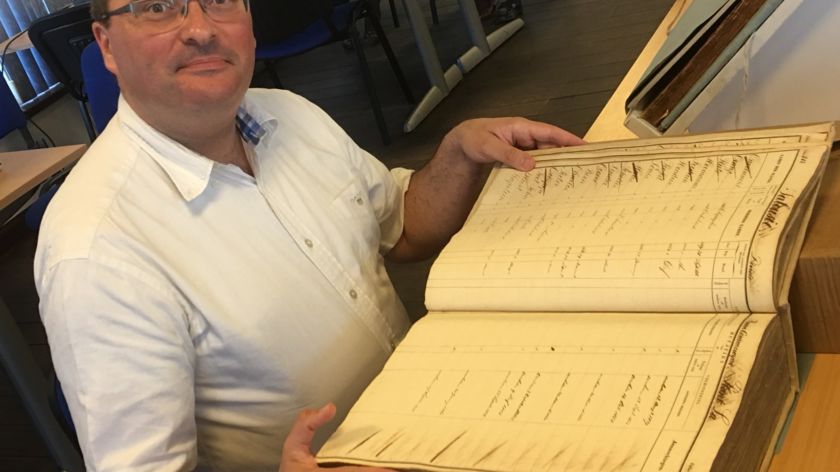Historian wants to disclose slave records
-
 Historian Coen van Galen with one of the books.
Historian Coen van Galen with one of the books.
The life story of 80.000 enslaved people from Surinam is documented in 42 huge books from that period. But these slave records have never been studied properly. Historian Coen van Galen wants to change that.
At the beginning of the 19th century, 85 percent of the population of colony Surinam consists of enslaved people (the term ‘slave’ is a sensitive one), and still these people have stayed relatively unknown. This is odd, because the group’s data are well-documented. ‘Why this hasn’t been done before, is a mystery to me’, says historian Coen van Galen. ‘But I am happy to do it.’
The records are complete and filled in very well, says Van Galen. ‘The Dutch have always been good bureaucrats, you can see that here.’ Far before The Netherlands abolished slavery (in 1863), the international slave trade was forbidden. To fight illegal smuggling, all enslaved people were registered, including their date of birth, their mother’s name, and changes like death, release or sale, and other information that was important to their value.
Al that info was written down between 1830 and 1863, in huge slave records, that are stored at the National Archive Surinam. The problem with these books is that they are not digitalised and they lack an index. In other words: they are not ideal as research material. Van Galen wants to change this. ‘I want to create a digital public and researche database out of them, useable for everybody.’

He does need some help to get this project done: a crowdfund campaign, launched today, has to raise 25.000 euros. On top of that, the historian is looking for ‘many helping hands from volunteers’, who help to type out the information from the scans.
When that is done, Van Galen will study the material. This could lead to interesting insights. ‘These people’s average lifespan says a lot about their standard of living. Working on a sugarcane plantation was much tougher than working on a cotton plantation – I expect to see traces of this in the data.’ Women who worked in the house had a harder life than men who did the same work – the man of the house could have the tendency to sexually assault his female staff. Something that could possibly be seen in the birth numbers.
Apart from the scientific relevance, this project is also relevant for society, says Van Galen. ‘Our history of slavery is still topical. This project can help all individuals who had a totally subordinate place during slavery – and whom we usually know nothing of – get their earned place in history. And that in itself can help us to finally give slavery a good place in our current society.’
More information about the crowdfunding campaign (Dutch), can be found here.



